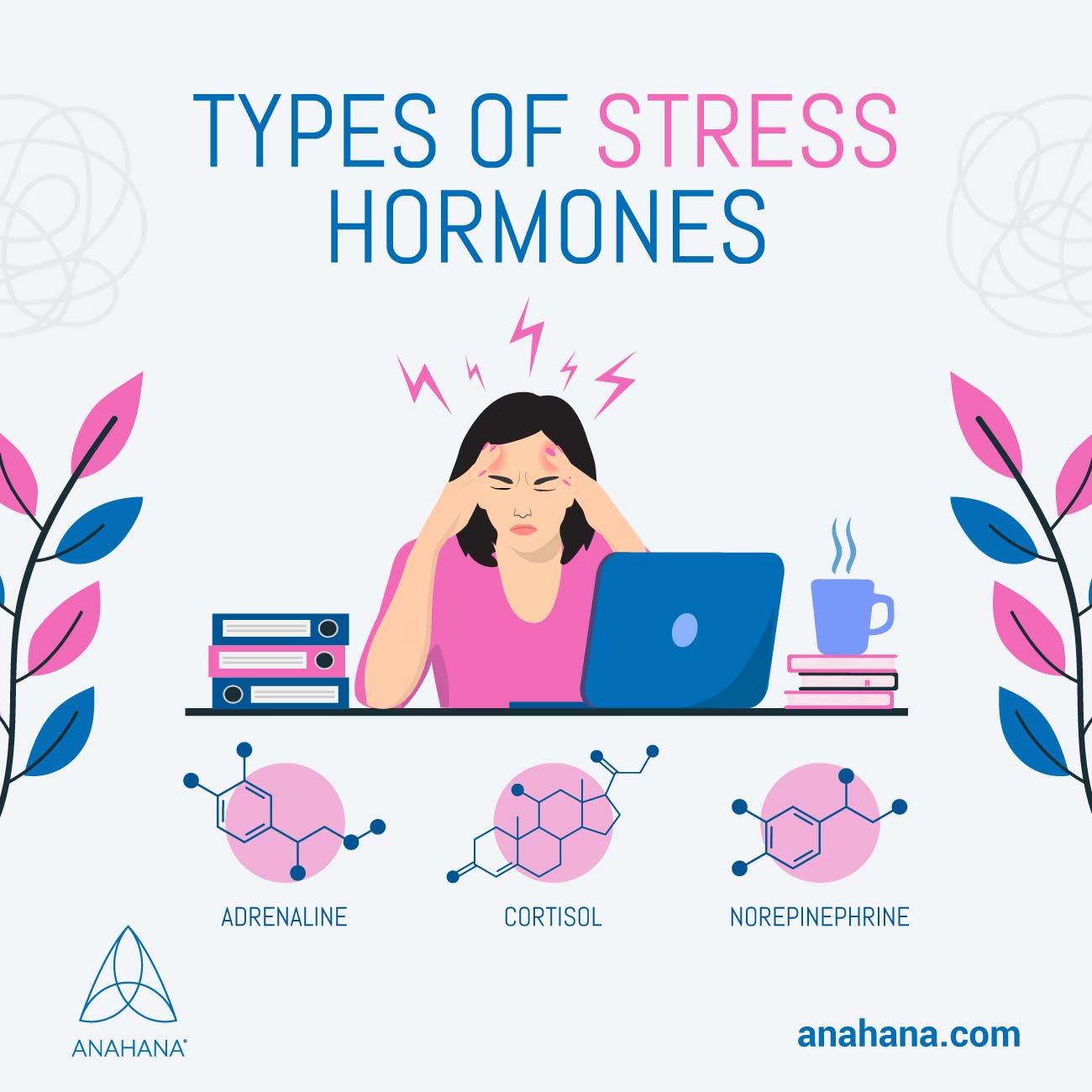
Table of Contents
Stress hormones are released in response to environmental stress. Chronic stress leads to the overproduction of stress hormones, causing physical and mental problems. Techniques like deep breathing, physical activity, and emotional processing can help manage stress and maintain healthy hormone levels.
Key Takeaways
- Definition: Stress hormones, like cortisol and adrenaline, are released by the body in response to stress.
- Function: They prepare the body for a "fight or flight" response, increasing heart rate, blood pressure, and energy supply.
- Effects: Chronic stress can lead to prolonged high levels of stress hormones, impacting health negatively.
- Health Impact: Elevated stress hormones are linked to anxiety, depression, and heart disease.
- Management: Techniques like mindfulness and exercise can help regulate stress hormone levels.
- Balance: Maintaining a balanced lifestyle is key to managing stress hormones effectively.
What are Stress Hormones?
Stress hormones are chemicals released in response to stress from the environment. These stress hormones can have a significant impact on the body. One of the most well-known stress hormones is cortisol, produced by the adrenal glands.
Cortisol levels can increase during acute stress, such as when someone is facing a stressful situation or event. Other common stress hormones include adrenaline and norepinephrine.
How Do Stress Hormones Impact the Body?
Constant stress, characterized by prolonged exposure to stressors, can significantly impact physical and mental health. This type of stress can lead to various adverse effects on the body, including high blood pressure, weight gain, and increased cortisol production by the adrenal glands. In response to acute stress, stress hormones such as cortisol are released, activating the sympathetic nervous system and triggering the "fight or flight" response.
Nervous System
When a stress hormone like cortisol is released in response to acute stress, the sympathetic nervous system is activated, leading to the well-known "fight or flight" response.
This response is a survival mechanism that prepares the body to respond quickly to potentially life-threatening situations. When stress becomes chronic, the response system can become overactive, leading to prolonged activation of the sympathetic nervous system and increased cortisol by the adrenal glands.
Parasympathetic Nervous System
Stress hormones can have a significant impact on the parasympathetic nervous system, which is responsible for regulating the body's rest and digest response. When cortisol levels are elevated due to acute or chronic stress, the sympathetic nervous system is activated, increasing blood pressure, heart rate, and respiratory rate. This can lead to decreased parasympathetic activity, reduced digestion, decreased blood flow to the skin, low blood pressure, and decreased relaxation responses.
Mental Health
Chronic stress can lead to the overproduction of stress hormones such as cortisol, significantly impacting mental health. When cortisol levels remain elevated for long periods, they can cause damage to the brain's hippocampus, which is a part of the brain responsible for learning and memory. This can lead to cognitive problems, such as difficulty concentrating and remembering things.
Moreover, high levels of cortisol can also disrupt the brain's neurotransmitter systems, which can affect mood, causing symptoms of anxiety and depression.
Types of Stress Hormones

Adrenaline
Adrenaline is a hormone and neurotransmitter that plays a vital role in the body's stress response system. It is produced by the adrenal glands and released into the bloodstream in response to stress, fear, or excitement.
Adrenaline is a crucial component of the body's stress response system, known as the hypothalamic-pituitary-adrenal (HPA) axis. When the body perceives a threat or stressor, the hypothalamus in the brain signals the pituitary gland to release adrenocorticotropic hormone (ACTH), which stimulates the adrenal glands to release adrenaline and other stress hormones, such as cortisol.
Adrenaline has a wide range of effects on the body. It increases heart rate and cardiac output, causing blood to be pumped more quickly to the muscles and organs while constricting blood vessels in non-essential areas such as the digestive tract. It increases respiration rate and dilates the air passages in the lungs, increasing oxygen intake. Adrenaline also stimulates the liver to convert stored glycogen into glucose, providing an energy source for the body during stress.
How Does Adrenaline Work?
Adrenaline binds to specific receptors on cells throughout the body, including the heart, blood vessels, and lungs. When adrenaline binds to these receptors, it triggers a cascade of events that result in increased heart rate, blood vessel constriction, and increased oxygen delivery to the muscles.
This response helps the body respond quickly and effectively to a perceived threat. Adrenaline also affects the body, increasing glucose production and inhibiting digestion.
Cortisol
Cortisol is a steroid hormone the adrenal gland produces in response to stress. It plays a crucial role in maintaining the body's homeostasis by regulating various physiological processes such as glucose metabolism, immune response, and blood pressure. Interestingly, cortisol levels follow a diurnal pattern, with levels highest in the morning and gradually decreasing throughout the day.
Cortisol is synthesized from cholesterol, which is a type of lipid molecule. It is produced and released by the adrenal glands in response to a signal from the hypothalamus and pituitary gland, which are part of the brain's endocrine system.
The hypothalamus releases a corticotropin-releasing hormone (CRH), which stimulates the pituitary gland to release adrenocorticotropic hormone (ACTH) into the bloodstream. ACTH then stimulates the adrenal glands to produce and release cortisol.
A negative feedback loop regulates cortisol production, a control system that maintains a stable internal environment or homeostasis. When cortisol levels rise, it inhibits the production and release of CRH and ACTH, decreasing cortisol production. This feedback loop helps to ensure that cortisol levels stay within a narrow range, which is necessary for the hormone to function properly.
How Does Cortisol Work?
Cortisol binds to specific receptors on cells throughout the body, including the liver, muscle, and fat tissue. Once bound, it activates various intracellular signaling pathways, ultimately leading to the desired physiological response.
For example, cortisol stimulates the breakdown of glycogen in the liver, leading to increased blood glucose levels. It also inhibits glucose uptake in muscle and fat tissue, which spares glucose for use by the brain.
One interesting fact about cortisol is that chronic stress can lead to dysregulation of cortisol levels, harming physical and mental health. For instance, high cortisol levels have been linked to an increased risk of obesity, type 2 diabetes, and cardiovascular disease. Chronic stress and dysregulated cortisol levels have also been linked to mental health conditions such as depression and anxiety.
In addition, when adrenal glands do not produce enough cortisol, it could lead to adrenal insufficiency or Addison's Disease. This disease, even though rare, may occur at any age when your immune system attacks your healthy adrenal glands by mistake.
Norepinephrine
Norepinephrine is a catecholamine neurotransmitter and hormone synthesized from the amino acid tyrosine in the adrenal glands and certain neurons in the central nervous system. It binds to adrenergic receptors on the surface of cells, which can activate various signaling pathways in the body.
The effects of norepinephrine on the body are mediated through its actions on the sympathetic nervous system, which is responsible for the "fight or flight" response to stress. In this response, the adrenal glands release norepinephrine and other hormones into the bloodstream, which causes an increase in heart rate, blood pressure, and blood glucose levels, as well as increased blood flow to the muscles and decreased blood flow to the digestive system.
How Does Norepinephrine Work?
Norepinephrine works by binding to specific receptors on cells throughout the body, including the heart, blood vessels, and lungs. When norepinephrine binds to these receptors, it triggers a cascade of events that result in increased heart rate, blood vessel constriction, and increased oxygen delivery to the muscles.
Increased oxygen delivery to the muscles helps the body respond quickly and effectively to a perceived threat. Norepinephrine acts as a neurotransmitter in the nervous system, transmitting signals between nerve cells. It involves many functions, including attention, learning and memory, mood, and arousal.
What Happens When Stress Becomes Chronic?
When stress becomes chronic, this response system can become overactive, leading to prolonged activation of the sympathetic nervous system and increased cortisol levels. This can lead to various health problems, including muscle tension, immune system suppression, and elevated heart disease risk.
Additionally, chronic stress can cause damage to the brain's hippocampus and disrupt the neurotransmitter systems that regulate mood, leading to symptoms of anxiety and depression. Therefore, understanding the impact of chronic stress on the nervous system is essential for effective stress management and maintaining overall health.
How to Maintain Stress Hormone Levels
Maintaining healthy stress hormone levels is essential for overall health. The endocrine system, which produces and regulates hormones, is crucial in managing stress. Hormonal signals, such as the hormone cortisol, are released in response to stressful situations, causing a physical response in the body. However, when stress levels are consistently high, it can negatively affect the body's processes, including the digestive, growth, and even reproductive systems.
Managing stress through techniques such as deep breathing, physical activity, and emotional processing is important to maintain healthy stress hormone levels. A healthy diet can also help regulate hormone levels and prevent metabolic disorders. A mental health professional can also provide guidance and support for managing psychological stress.
Relaxation Techniques
Relaxation techniques can effectively manage stress and maintain healthy levels of stress hormones in the body. One helpful technique is deep breathing exercises. The body's parasympathetic nervous system is activated by slowing breathing and taking deep breaths, promoting relaxation and reducing stress levels.
Muscle Relaxation
Another relaxation technique is progressive muscle relaxation, which involves tensing and relaxing different muscle groups. This technique helps to release muscle tension and reduce physical symptoms of stress, such as headaches and body aches.
Meditation and yoga are effective relaxation techniques that help reduce stress and maintain healthy stress hormone levels. In addition to these techniques, engaging in regular physical activity, maintaining a healthy diet, and getting enough sleep can all contribute to reducing stress levels and promoting the healthy functioning of the endocrine system.
Conclusion
Stress hormones are chemicals the body releases in response to stress. Cortisol, adrenaline, and norepinephrine are common stress hormones that can significantly affect the body.
Maintaining healthy stress hormone levels is important for overall health, and various techniques, such as deep breathing, physical activity, and emotional processing, can help manage stress. Relaxation techniques like meditation and yoga maintain healthy stress hormone levels.
Resources
Adrenaline, Cortisol, Norepinephrine: The Three Major Stress Hormones, Explained
How Stress Affects Your Body and Behavior
Relaxation Techniques for Stress Relief
The Physiology of Stress: Cortisol and the Hypothalamic-Pituitary-Adrenal Axis
Mindfulness-Based Stress Reduction
What Are Stress Hormones and How Do They Impact You?
Disclaimer
The contents of this article are provided for informational purposes only and are not intended to substitute for professional medical advice, diagnosis, or treatment. It is always recommended to consult with a qualified healthcare provider before making any health-related changes or if you have any questions or concerns about your health. Anahana is not liable for any errors, omissions, or consequences that may occur from the use of the information provided.

By: Anahana
The Anahana team of researchers, writers, topic experts, and computer scientists come together worldwide to create educational and practical wellbeing articles, courses, and technology. Experienced professionals in mental and physical health, meditation, yoga, pilates, and many other fields collaborate to make complex topics easy to understand. Anahana is also home to specialists in crystals, tarot, angel numbers, astrology, life path numbers, zodiac signs, and horoscopes. By combining evidence-based wellness with spiritual and energetic practices, the team offers clear, trustworthy guidance for both mind-body health and modern spirituality.